Published Apr 3, 2017
John Jackson Miller Talks Prey Audiobooks
John Jackson Miller Talks Prey Audiobooks

The Star Trek: Prey audiobook series by John Jackson Miller will conclude tomorrow, April 4, when Simon & Schuster Audio releases Star Trek: Prey, Book 3 - The Hall of Heroes. Today, Miller talks to StarTrek.com about his work as an author and comic book writer, the Prey series and the fact that Robert Petkoff, who has narrated all three Prey audiobooks, has become the voice of his -- and Simon & Schuster Audio's -- Star Trek audio adventures. Here's what he had to say:
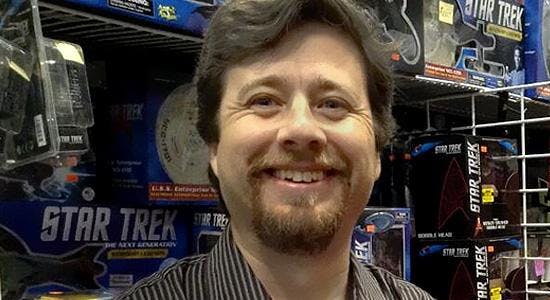
Q: How did you get your start as an author and comic book writer?
John Jackson Miller: I've been writing my own comics and prose stories for as long as I've been reading them -- and I've been a fan of Star Trek, Star Wars, and other science fiction and fantasy stories for just about as long. After editing my high school and college newspapers, I used my journalism degree to get a job editing the trade magazine for the comics industry back in the 1990s. That led to my running books and magazines about comics and collectible card games -- until, eventually, I got the chance to write comics on my own.
My first professional comics series, Crimson Dynamo, was for Marvel and led to a year writing Iron Man. That opened the door for me to write Star Wars comics, which I did for many years afterward. The series I'm best known for, Star Wars: Knights of the Old Republic, ran for several years in various incarnations; Marvel just published the second collection containing the middle third of that series in a big Old Republic Epic Collection volume this month. Writing for Star Wars comics led to my writing prose for that universe, including the Lost Tribe of the Sith short stories, the Knight Errant novel, and the Scribe Award-winning Star Wars: Kenobi, detailing the first month of Obi-Wan Kenobi's sojourn on Tatooine. More recently, I wrote the Rebels TV series tie-in Star Wars: A New Dawn, the first novel in the new Lucasfilm Story Group era of storytelling.
Around the same time as that book, I had started writing Star Trek prose for Simon & Schuster, with an e-book called Star Trek: Titan - Absent Enemies; that led to my first full-length novel for Trek in 2015, called Star Trek: The Next Generation - Takedown. That was a naval yarn pitting Picard and his newly promoted protege Admiral Riker on opposite sides of a conflict - and it was enjoyable enough for me that when my editor asked about my writing another book, I suggested the trilogy that later became Star Trek: Prey.
Prey really encapsulates everything I love about Star Trek: it's an exciting story that really delves into the relationship between the Federation and the Klingon Empire across several generations, involving both sections with the TOS crew and The Next Generation. We even get a section with Sulu's Excelsior crew, including Tuvok. The story follows what happened to the House of Kruge, Christopher Lloyd's character from Star Trek III: The Search for Spock, after that Klingon commander went to his fiery end on the Genesis planet. That, it turns out, was just the beginning -- and the story that unfolds from there has major impact later on the lives of Picard, Riker, and Worf. There's also a big role for the clone of Kahless. The audiobook versions are unabridged, so the production really gives the listener a sweeping epic.
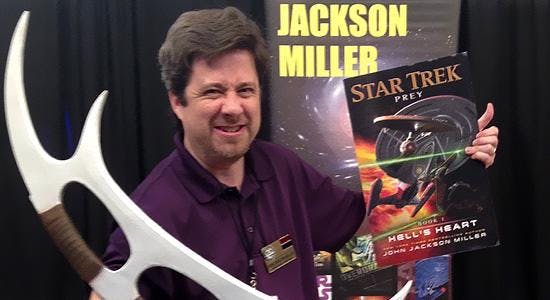
Q: Is reading your work aloud part of your writing or editing process?
John Jackson Miller: Increasingly. After my first audiobook was recorded -- Star Wars: Kenobi in 2013 -- I began thinking a lot more about the narrators, and what they would have to contend with. I think that my dialogue had always been easily speakable, given that I had come from comic books where the lines are relatively short -- but in prose the sentences are more elaborate. To a degree, I've begun drawing more and more on my college journalism experience learning how to write for broadcast. In general, though, if a sentence is going to be difficult for a narrator to read aloud, it's going to be hard for any reader to navigate. So I always try to keep that in mind.
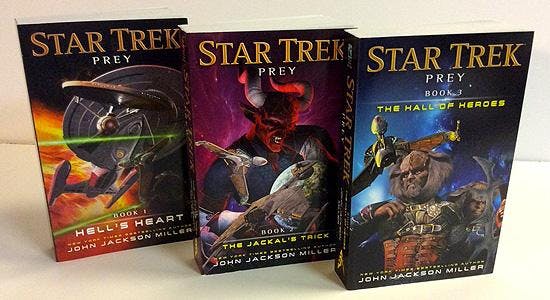
Q: How does it feel to have your Star Trek: Prey series recorded as audiobooks?
John Jackson Miller: Outstanding. I was brought in early to help advise the production team on pronunciations and also suggest how some characters might best be voiced, and for each book we discussed all the new words in use. Even better, I was able to enlist the help of Klingon language instructor Felix Malmenbach, who provided audio examples of most of the Klingon terms and sentences in the trilogy. Robert worked hard to master them. I'm proud of all the effort everyone put in.

Q: Robert Petkoff has narrated all of your Prey audiobooks. Is there a specific scene or character in his performance that stands out to you? What did you enjoy most about it?
John Jackson Miller: Among the cast members original to Prey, Korgh is a character we hear as an angry and entitled youth in Kirk's era, and then as a cagey chess-master a hundred years later. Robert managed to capture both versions; you can tell it's the same character, but there's a hundred years of experience in there during which Korgh learned how to measure his words for best effect. Hearing Robert's Korgh was a great experience.
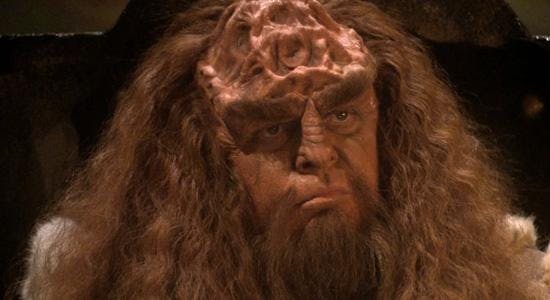
Q: If you could have dinner with any of the characters in the Prey series, who would it be and why?
John Jackson Miller: Among the TV and film characters, certainly Kahless would be a lot of fun to spend time with: the Hell's Heart book includes an early scene with Kahless as a dinner guest, and he's pretty amusing. It's not every day you can have the clone of a legendary Klingon to dinner. From the original characters from the book, the aged Korgh is so wily that fencing verbally with him would certainly be a challenge. Of course, in either case I would be hoping the chef would prepare something for me for those on low-gagh diets.
Q: You've written for several franchises including Star Wars, Overdraft, Conan, Iron Man, Indiana Jones, Mass Effect and The Simpsons. Where do you draw your inspiration from and how do you create such vivid worlds within the books?
John Jackson Miller: From the original properties, of course -- but also from history and literature. Star Trek is a lot of fun in this regard because I can actually mention historical events that the characters might know about. In the case of Prey, there's a large subplot involving the various illusionists in the Star Trek universe, of which there have been quite a few; that section allowed me to delve into the life of Houdini and other Earthly magicians, and mention things like the Chicago Exposition. And then the feeling of a lot of books is inspired by other sources. Prey is sort of the Klingon equivalent of some of the Cold War paranoia thrillers like The Manchurian Candidate and Seven Days in May; the Trek universe and characters are good at telling all sorts of stories, and I was pleased at how well we were able to make the combination work in Prey.
Prey doubles the number of audiobooks of my stories, and I'm thrilled to have the new productions out there. Readers who would like to learn more about my works can find production notes on many of them at http://www.farawaypress.com. I can also be found on Twitter at http://twitter.com/jjmfaraway.
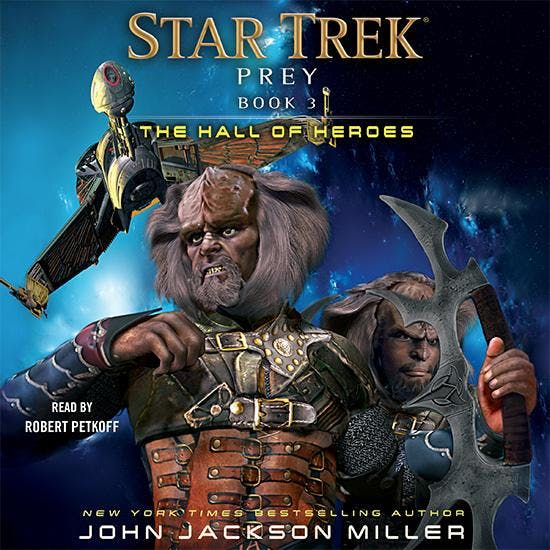
And here's the full synopsis of Star Trek: Prey - Book 3:
Continuing the milestone 50th anniversary celebration of Star Trek - an epic new trilogy that stretches from the events of The Original Series movie The Search for Spock to The Next Generation.
The Klingon Empire stands on the precipice. In the wake of violence from the cult known as the Unsung, paranoia threatens to break Chancellor Martok’s regime. Klingons increasingly call for a stronger hand to take control...one that Lord Korgh, master manipulator, is only too willing to offer.
But other forces are now in motion. Assisted by a wily agent, the Empire’s enemies secretly conspire to take full advantage of the situation. Aboard the USS Titan, Admiral William T. Riker realizes far more than the Federation’s alliance with the Klingons is in danger. With the Empire a wounded animal, it could either become an attacker—or a target.
Yet even as hostilities increase, Commander Worf returns to the USS Enterprise and Captain Jean-Luc Picard with a daring plan of his own. The preservation of both the Empire and the Federation alliance may hinge on an improbable savior leading a most unlikely force....
Go to Audible: http://adbl.co/2n43zqh to purchase Star Trek: Prey - Book 3.
